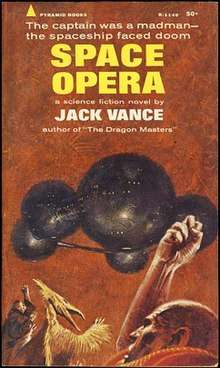Space Opera (Vance novel)
Space Opera is a novel by the American science fiction author Jack Vance, first published in 1965 (New York: Pyramid Books).
 First edition | |
| Author | Jack Vance |
|---|---|
| Cover artist | John Schoenherr |
| Country | United States |
| Language | English |
| Genre | Science fiction |
| Publisher | Pyramid Books |
Publication date | February 16, 1965[1] |
| Media type | Print (Paperback) |
| Pages | 143 |
This is a stand-alone work, not part of any of Vance's numerous novel sequences. The term "space opera" is typically used in science fiction literature to connote interstellar adventures, clashes of spacefleets and galactic empires. Vance's novel is instead about an opera company touring in outer space.
Plot summary
On Earth, audiences are entranced by the musical entertainments staged by an alien troupe, the Ninth Company of the planet Rlaru. Dame Isabel Grayce (one of a long line of formidable society matrons in Vance's works) has sponsored the entertainments; when the Ninth Company disappears without a trace, she proposes to recoup her losses and bring culture to the wastes of space by forming an opera company which Adolph Gondar (the discoverer of Rlaru) will pilot on a tour of suitable planets, with Rlaru as ultimate destination. Singers, orchestra, a British conductor (Sir Henry Rixon) are engaged; an argumentative critic, Bernard Bickel, who thinks the Ninth Company were fakes, is hired as musical consultant. Dame Isabel's indolent and aptly named nephew Roger Wool (one of a long line of Vancian put-upon nephews) tags along also, smuggling his new girlfriend Madoc Roswyn, who claims to be a simple girl from Merioneth in Wales, aboard the ship as a stowaway.
Like many of Vance's works, the novel is a picaresque; Gondar has his own reasons for not returning to Rlaru, and diverts the company half way round the galaxy, with various adventures or humiliations occurring on the different planets they touch down on. (There are some similarities with Vance's later novel Showboat World, which has a travelling company presenting performances of Shakespeare's Macbeth to generally uncomprehending audiences along an immense river on a distant planet.) Over the course of the voyage, the company stages several celebrated works, such as Beethoven's Fidelio, Mozart's The Magic Flute and Così fan tutte, Rossini's The Barber of Seville and Wagner's Tristan und Isolde and Flying Dutchman. These are performed before various human or non-human audiences, the libretti and costumes sometimes having to be adapted to become understandable to alien cultures. On the whole, due to such cultural disparities, their reception is far from that expected by Dame Isabel: on a penal colony planet, for instance, the performances are made the cover for a jail-break; on a planet inhabited by a race priding themselves on their musical talents, the productions are vetted by an artistic inspector and the company is fined for every unresolved dissonance in the scores performed; on still another, the performance is mistaken for a trade exhibition and the aliens attempt to buy some of the singers.
While Gondar is confined to his cabin, apparently insane, Madoc Roswyn induces his deputy to take the ship to the distant planet Yan. It emerges that her remote ancestors inhabited a land now sunk beneath the Bay of Biscay whose people had colonized that planet and there developed a high civilization. (Here we detect the germ of Vance's later major fantasy trilogy Lyonesse, the heroine of whose third volume is named Madouc.) A group had returned to Earth thousands of years later, but their spacecraft was destroyed and they were forced to settle in Wales, ever intending to return to Yan. Madoc is their last descendant. She is disappointed by what she finds: Yan's cities are dust and its folk have reverted to barbarism, hiding in the forests. Although the company present Debussy's Pelléas to try to establish communication with the unseen inhabitants, they barely escape with their lives.
Eventually the voyage ends at Rlaru. It turns out that Gondar had abducted the Ninth Company from the planet; he is suitably punished by the natives, who demonstrate a capacity to creatively manipulate illusion and environment far beyond anything their Earth visitors can achieve. They listen to several operas with mounting boredom, but are utterly entranced by an impromptu washboard jazz band formed by some members of the crew, which has been a source of annoyance to the opera-lovers throughout the voyage. (Vance was at one time a jazz musician.) Dame Isabel returns to Earth, chastened but determined not to admit it; Roger marries Madoc Roswyn and begins writing a book describing the voyage.
Sources
- Underwood, Tim; Chuck Miller (1980). Jack Vance. New York: Taplinger Publishing Company. p. 229. ISBN 0-8008-4295-2.
- "Books Today". The New York Times: 32. February 16, 1965.